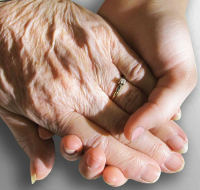 When a loved-one’s diagnosis with Alzheimer’s syndrome is still brand new, it is easy to get buried deep in denial. If you catch yourself saying “When this gets better…,” this is proof that you are being incredibly unrealistic and setting yourself up for a bad time. Here’s what’s real: It will not get better or go away: things will only get worse and you just aren’t preparing for it.
When a loved-one’s diagnosis with Alzheimer’s syndrome is still brand new, it is easy to get buried deep in denial. If you catch yourself saying “When this gets better…,” this is proof that you are being incredibly unrealistic and setting yourself up for a bad time. Here’s what’s real: It will not get better or go away: things will only get worse and you just aren’t preparing for it.
I first encountered this denial when a family member said this about her recently-diagnosed husband. I knew she was hiding from the truth, so I intentionally bullied her to get her to open her eyes. It had to be done: she couldn’t start planning for her future until she saw the truth of the situation.
Following is a summary of what I sent to her. I’m hoping this will be as helpful to others as it was in her situation.
Getting started: This shit is real!
Denial is a dangerous thing, especially when there are things you should be doing right early on while it can still be done. Go someplace where you won’t be interrupted and learn what you are up against. All of these videos are good, but no matter what, commit to at least watching the first one, as it does the best job I’ve ever seen of really explaining what is going on:
- A Changing Brain: This short video does a remarkable job of explaining what’s changing in the brain in a person with dementia. It does not go all technical and it doesn’t talk down to you. It is very personable and explains not only what is happening in the brain, but how this shows up in the behavior of a person in whom this is going on.
- Alzheimer’s: Every Minute Counts: This PBS film talks about how Alzheimer’s is reaching epidemic levels and it gives you a good, realistic background of what to expect. (But honestly, I think that the Changing Brain video above is better.)
- Can Alzheimer’s Be Stopped? This is a documentary about research into a cure. It’s not for everyone, but having a realistic idea about what is being done can help. The takeaway for us as I write this in 2018 is that a cure is not around the corner, so be prepared! [EDIT: And in 2022, that cure is still not around the corner…]
 The unpleasant reality (a.k.a. The ugly truth): What to expect
The unpleasant reality (a.k.a. The ugly truth): What to expect
Let’s just be blunt: The ugly truth is that Alzheimer’s is a progressive disease for which there is no cure and that results 100% of the time in death. There are some things that can help (a bit) with some symptoms (sometimes), but at the time I write this, there really is no way to stop the disease.
The Alzheimer’s patient’s brain is literally shrinking from the outside in, with the functionality of the outer layers of the brain fading first, and this will keep progressing until the patient dies. Your loved one will change from an articulate and circumspect person, to, well, someone who is none of those things. He might just slowly fade away, remembering less and less, and eventually no longer be able to care for himself, recognize others, or really be aware of much of anything at all. Or he might go through drastic personality changes, in some cases even becoming hostile, mean, or even violent.
Whatever the individual path your loved one takes, the Alzheimer’s road finally ends in death. No sugar-coating there.
Same old thing? Depending on your loved one’s stage in the disease, after the diagnosis, you may have a period of time that seems nearly normal. As you notice an increase in memory lapses, you may also notice how your loved one seems to be forgetting words for things. He’ll start to forget who people are, even family members, especially those he hasn’t seen for years, although this may be intermittent at first. Eventually he will forget important things like how many children he has, or what their names are.
This is often stressful, embarrassing, and even alarming for your loved one, so it is very important to stay patient. Don’t call his attention to it or correct him, as this will usually just confuse or embarrass him.
Stages of Alzheimer’s: This disease is generally broken into seven major stages. It’s helpful to understand which stage you’re dealing with, and this also provides a common reference when you talk with caregivers and others.
 Driving and wandering: He may start to get lost more often, and at some point will no longer be able to drive safely. At this point you must take away the car keys, not just because he tends to get lost, but because he is much more likely to cause an accident and is a danger to himself and others. Even on foot, he might get lost on the way home from the mailbox, or forget why he was outside in the first place and wander away. Talk to your neighbors to make sure they understand what’s going on and they know how to contact you. Get him an ID bracelet with your contact info on it so others can help him. (Here’s one solution, but there are other options too.)
Driving and wandering: He may start to get lost more often, and at some point will no longer be able to drive safely. At this point you must take away the car keys, not just because he tends to get lost, but because he is much more likely to cause an accident and is a danger to himself and others. Even on foot, he might get lost on the way home from the mailbox, or forget why he was outside in the first place and wander away. Talk to your neighbors to make sure they understand what’s going on and they know how to contact you. Get him an ID bracelet with your contact info on it so others can help him. (Here’s one solution, but there are other options too.)
Car Key Trick: If your loved one feels that his key ring is a source of comfort, or if it gives him a feeling that he has some modicum of control, taking the keys away might really hurt. Instead, replace the car key on his key ring with a key to some other car to which he has no access.
A new relationship with sound: Your loved one might begin to become extra sensitive to some stimuli, such as finding the audio on TV or radio commercials too loud. When watching TV or movies, keep the remote in your hand to mute commercials or turn the volume down when the music gets loud. This takes some diligence, as many programs make the music louder and softer many times throughout the show.
Time for a sitter — Respite Care: Eventually it will become dangerous to leave him unattended, because he may do something dangerous, like use the stove incorrectly and start a fire, or hurt himself trying to work on something in the yard or garage. When you need to get away for a break or if you have errands to run, you will either need to take him with you or to an adult daycare place, or you can have someone come into the house. Look into a service like Visiting Angels or Home Instead that will provide home care.
Plan Ahead: Be sure to contact helpful agencies and set things up well before you reach the point of needing their help. Many require a get-acquainted meeting and other steps before providing services.
Extra help: At some point further along the path, he may need help bathing, eating, and dressing. Even if you are able to help with this, keep your own well-being in mind and consider getting help. Turn to home health care services like the ones I mention above to help with this, especially if he is getting angry and might act out.
 Moving to a facility: Are you in danger? Some Alzheimer’s patients never get this way, but many become mean, angry, or even violent. At this point, it can literally be dangerous for you and your loved one for him to stay at home. Another scenario is that, even if he is not violent or dangerous, he may need around-the-clock attention that you are not able to give. The truth of the matter is that, eventually the best place for your loved-one may be a long-term care facility. The point when that is needed is different for every patient — some people get there fast, some people take many years to get there. [EDIT: This is extremely expensive, but there are options. Hire a financial advisor to at least look into it.]
Moving to a facility: Are you in danger? Some Alzheimer’s patients never get this way, but many become mean, angry, or even violent. At this point, it can literally be dangerous for you and your loved one for him to stay at home. Another scenario is that, even if he is not violent or dangerous, he may need around-the-clock attention that you are not able to give. The truth of the matter is that, eventually the best place for your loved-one may be a long-term care facility. The point when that is needed is different for every patient — some people get there fast, some people take many years to get there. [EDIT: This is extremely expensive, but there are options. Hire a financial advisor to at least look into it.]
Save yourself. A critical question when dealing with the disease is, “How many lives are we going to let it destroy?” Alzheimer’s is taking your loved one away. Don’t let it take YOU away, too.
Make life better, not longer
We are used to thinking in terms of prolonging life. But now that Alzheimer’s is involved, the best outcome is for life not to linger beyond the point that your loved one is still “there.”
It’s time to switch your thinking away from “make life longer” to instead focus on “make life better.”
Any time you take your loved one to the doctor, say a firm NO to procedures meant to lengthen life and instead focus on doing things to increase his comfort. That means YES to medicines and procedures meant to reduce pain, but NO to things like a pacemaker, routine diagnostics like a colonoscopy, or most surgeries. Ask yourself: Will this be an uncomfortable ordeal that is just to lengthen life rather than immediately making him more comfortable or happier? Is it worth discomfort, a painful procedure, or a recovery period? Usually the answer is no.
Often, even if subconsciously, you may say yes to procedures not because your loved one wants it but because we do, often because you need to feel like you’re doing something that will help. But are you really helping? Ask yourself: Am I doing this FOR him, or am I doing it TO him? Your mantra here is: “Better, not Longer.”
Two things to start to prepare
You have a very rocky road ahead. The more you plan and prepare now, the easier it will be for your future self to deal with what’s coming.
Legal/financial
Make sure that you have all your finances set up so that you will have your legal and financial affairs in order. This includes medical and financial powers of attorney (POAs), Advanced Health Care Directives, understanding Medicare, setting up joint finances in trusts, planning for the almost definite expense of long-term care, and more. While there are many good online resources available to you, your best bet is to contact an attorney in your area who specializes in these things to help you plan it out. Ask for recommendations from your local Alzheimer’s support group, or check out this directory of attorneys maintained by the National Academy of Elder Law Attorneys (NAELA) to get started.
Scope out your resources
Start now to make note of the adult care and Alzheimer’s resources in your area, and especially start looking into long term care facilities. When the need arises for outside help it will be an extremely stressful time for you, so make things easier on your future self by being prepared. Many places involve waiting lists, so check into this earlier rather than later. The first place to go to start this search is the Alzheimer’s Association website at alz.org. They have a great roundup of resources, and you can pare it down to only stuff available in your area. They also have a page with lots of short films with advice and information about Alzheimer’s and about being a caregiver.
 Take care of yourself
Take care of yourself
One of the most overlooked tragedies of this disease is how it impacts not just the patients, but his family and especially his immediate caregivers: usually his spouse or children.
Taking the time to take care of yourself is very important. You have a long road ahead of you. This road will still include some sweet moments between you and your loved-one, but eventually you will be a full-time caregiver. Here are some specific pointers:
1. Keep your cool
Remind yourself that it is a disease and he can’t help it. Even in the early stages of the disease and especially as things progress, your loved one might be frustrating to deal with and will sometimes be a PIA (pain in the you-know-what).
He may be exasperating and stubborn sometimes, but unless you want to live in a constant state of annoyance, the best thing you can do is to keep reminding yourself of what is happening to his brain (refer back to the “Changing Brain” video referenced earlier in this post). When he frustrates you, remember that (a) He really can’t help it any more than a child or a mentally-ill person can, (b) It is not going to get better, only worse, and (c) You will actually make this harder for both of you if you let this make you angry or frustrated.
Is he driving you nuts? Blame his brain, but don’t blame him.
I know this is much easier said than done — but any time he is driving you nuts or you get frustrated, your mantra is: “Too bad about his brain.” This will remind you that he can’t help it and it’s not his fault, and it will be a “sympathy trigger” for you. (I have used this technique for many years when dealing with clients or colleagues who are difficult people. It really works!)
The point is, you wouldn’t get mad or snap at him for coughing too much if he had the flu… and in a way, this is the same thing: an annoying intrusion in your life due to an illness that he can’t control.
2. P.A.T.
Cherish the sweet moments when they come, but schedule time to get away! This is your PAT: Personal Away Time. For now at least every-other week or maybe even every week, schedule PAT for you to go see your grandkids, go to lunch with a friend, see a movie, or just go to a park and read a book. Eventually you will need to arrange for a family member or a respite care service to stay at your house while you are away, but don’t let this stop you.
3. GET @#$%! HELP!
Sadly, there is a growing number of people dealing with this disease today. Luckily, there are services out there to help: you’re not alone. The Alz.org foundation has a very, very well-staffed help line that is open 24/7. Their number is (800) 272-3900. The first time you call it will seem a bit overwhelming at first, but soon you will likely feel relieved to be getting some help. So Make That Call! They also have a great online resource center specifically for caregivers here: http://www.alz.org/care/
4. Use Your Helpers
Too many of us find it very difficult to ask for help. Keep in touch with your friends and family — there’s a good chance they will be happy to help. Who is in your local support network? (If you don’t have a local support network, get started creating one NOW!)
What next?
 One of the worst things you can do is attempt to deal with this all on your own. If this post applies to you, even if your loved-one’s Alz is very early in its process, do yourself and your family a favor by going to alz.org (or call them at (800) 272-3900) and find an Alz support group in your area.
One of the worst things you can do is attempt to deal with this all on your own. If this post applies to you, even if your loved-one’s Alz is very early in its process, do yourself and your family a favor by going to alz.org (or call them at (800) 272-3900) and find an Alz support group in your area.
Do it today. Do it right now.
[More posts about Alzheimer’s]